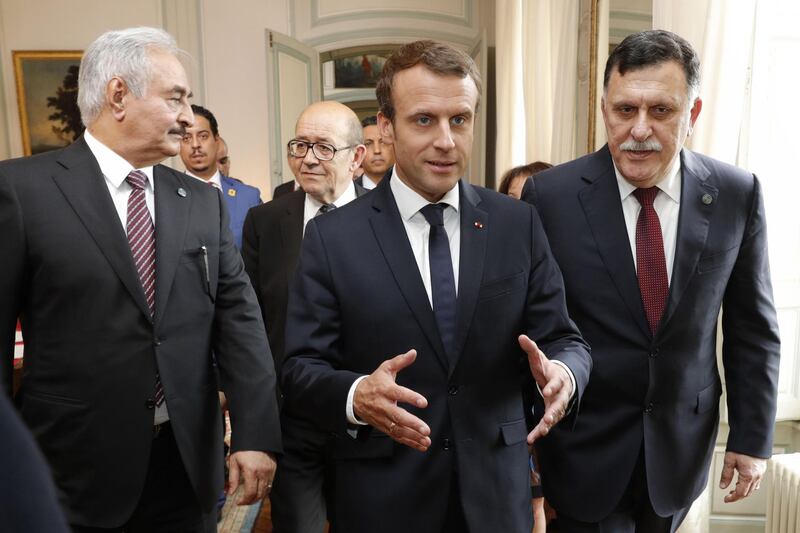France will host a UN-sponsored summit on Tuesday aimed at finally ending Libya’s chaos and civil war, bringing together the North African country’s key political players and dozens of international representatives.
In attendance will be Aguila Saleh, president of the elected parliament, the House of Representatives (HoR); its army commander Field Marshal Khalifa Haftar; Fayez Al Serraj, prime minister of parliament’s rival, UN-backed, Government of National Accord (GNA) in Tripoli; and Khaled Al Mishri, the head of the GNA’s High Council of State.
Added to that are a galaxy of global players with a stake in the country’s future, including representatives from the UAE, Saudi Arabia, Qatar, and Libya’s neighbours Algeria, Egypt and Tunisia, together with the UN, the Arab League, African Union and European Union. Also present will be the five permanent members of the UN Security Council – the US, China, Russia, Great Britain and France – plus Italy, the country that once colonised Libya.
On paper, French President Emmanuel has mustered a powerful gathering at the Elysee Palace. But, crucially, the leaders of the powerful militias that control Tripoli, Libya’s capital, will be absent. Without their acceptance, any agreement hammered out in Paris is likely to remain just a piece of paper.
Dissolving those militias was a key aspect of President Macron’s last Libya talks, held last July in Paris with Mr Al Serraj and Field Marshal Haftar, but those talks yielded no concrete results. Hoping for more progress this time, French diplomats have prepared a 13-point road map that reportedly includes dissolving militias and supporting Libyan elections by the end of the year.
_____________
Read more
France to push for Libya accord at Paris meeting
Haftar's return boosts hope for peace in Libya
_____________
The election pledge is central to the so-called Action Plan of Ghassan Salame, the head of the United Nations Support Mission for Libya.
But in May, Mr Salame told the Security Council he had abandoned a key stage of his plan, which was an attempt to reform the GNA’s constitution – known as the Libya Political Agreement – in a bid to win support from the elected parliament.
“At the conception of the Action Plan, the amendment of the Libyan Political Agreement was requested,” Mr Salame told the 15-seat body. “We have tried over and over, exploring different formula, attempting to reconcile various opinions, exploring means to accommodate ambitions. However, the parties are unwilling to make the necessary concessions.”
In effect, this means Libya will continue to have two rival governments, with the envoy now hoping elections later this year can produce a single unified government to replace them both.
Mr Salame will likely welcome France’s support, but his problem continues to be that Libya remains too chaotic for elections. Fighting is currently raging in the eastern town of Derna, as Field Marshal Haftar’s Libya National Army (LNA) seeks to rid the town of militias.
Separately, sporadic clashes between rival tribes continue in the south-western town of Sebha. In the capital, ISIS struck the headquarters of the High National Election Commission on May 7, killing 13 officials.
Last week, Mahmoud Jibril, former prime minister of Libya’s 2011 rebel government that led the overthrow and killing of Muammar Qaddafi, said his country remains unprepared for new polls. “To go for elections when the country is so divided – we are exposing the country to real partition,” he said.
Partition is the fear of outside powers who are concerned that Libya’s chaos has made the country a haven for migrant traffickers, drug smugglers and ISIS. Diplomats worry that oil-rich eastern Libya, which already has a separate parliament, government and army, may be tempted to go it alone, leading to the break-up of the country.
Some are calling for France to take a gradualist approach at the Paris summit. The International Crisis Group, a think tank, said: “French organisers should avoid imposing too rigid a framework and consider not seeking a signed agreement for now.
“Instead they could use the event to push Libyan leaders toward compromise.”





